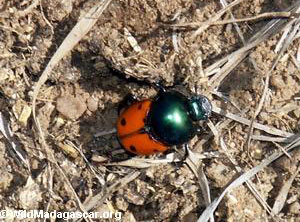Deforestation causes species extinction in Madagascar
Deforestation causes species extinction in Madagascar
Lack of lemur dung may contribute to demise of some beetles
Rhett A. Butler, mongabay.com
March 7, 2007
Deforestation has already caused the extinction of a large number of endemic insect species on the island of Madagascar, according to new research published in the March edition of the journal Biology Letters. The work suggests that only half the species confined to these forest areas will survive.
Madagascar has lost about half of its forest cover since 1953 including most of its coastal lowland forests, which have been diminished by about 90 percent. Species-area math, which holds that there exists a non-linear relationship between land area and the resident number of species, suggests that this habitat loss would result in the eventual extinction of about half the plants and animals.
Now, a team of researchers lead by Ilkka Hanski, a biologist from the University of Helsinki in Finland, has found evidence of extinction among endemic forest-dwelling Helictopleurini dung beetles. The beetles, which are generally large and colorful, feed on droppings of other animals.
The researchers report that extensive surveys conducted between 2002 and 2006 found only 29 of the 51 previously documented species. Modeling the apparent absence of the 22 species, their work indicates that deforestation is the “best predictor of whether a species was collected.”

Dung beetle in Madagascar. Photo by Rhett A. Butler |
“Species for which less than one-third of the 1953 forest cover remains tended to be apparently extinct,” wrote the authors.
Hanski and colleagues note that the disappearance of lemurs, which are the most largest producers of dung in Madagascar, has likely played a role in the demise of some species of dung beetle.
“Forest loss and fragmentation is associated with an increasing pressure on lemurs, the most important dung producers in Madagascar. According to the fossil record, 16 large-bodied lemurs have gone extinct since human colonization ca 2300 years ago,” they wrote. “The long-term and dramatic decline of H. undatus [a species of dung beetle] may be due to high degree of resource specialization. Unfortunately, nothing is known of its biology and by now this once exceptionally widespread species may already be extinct.”
The implications of forest loss extend well beyond dung beetles. The researchers continue to say that because “Madagascar has large numbers of species with narrow geographical ranges”, high levels of deforestation will doom large numbers of organisms to extinction. While the government has recently announced much-lauded plans to preserve 10 percent of the country in national parks, the researchers point out that this level of protection will result in the eventual extinction of half of Madagascar’s unique species.
“Our research shows that past and present deforestation poses a great threat to the unique biodiversity in Madagascar,” Hanski told mongabay.com via email. “Many endemic species have very small geographical ranges in Madagascar, and hence their viability is threatened by regionally heavy loss and fragmentation of forests. Our results suggest that a large fraction of species may already have been lost. This highlights the urgency of implementing as quickly as possible the new plans to protect the remaining natural forests.”